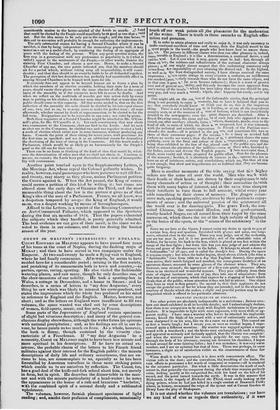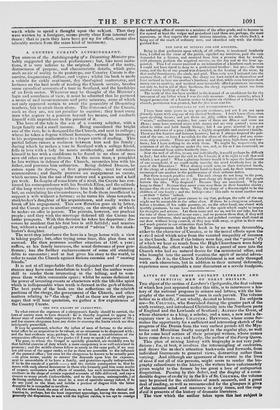COUNT DE MELFORT'S IMPRESSIONS OF ENGLAND. COUNT EDOUARD DE MELFORT
appears to have passed four years of his teens at the court of Naples, during the dashing reign of MURAT; and then to have served in two campaigns under the Emperor. At two-and-twenty he made a flying visit to England, where he had family connexions. Afterwards, he seems to have resided here for a considerable period ; mixing in the first society, and partaking of its amusements both in town and country,—as parties, operas, racing, sporting. He also visited the fashionable watering-places, and saw many, though he only describes one, of the show-mansions of our nobility. He took a sporting-box in Wales, a cottage in Devonshire, and a house in Sussex : and he describes, in a series of letters to "my dear* Augustus," every thing he saw which was likely to interest his correspondent, and states the impressions which the whole has produced on his mind in reference to England and the English. Matter, however, ran short ; and as the letters on England were insufficient to fill two volumes, the space wanted was eked out by some descriptions of women, field-sports, music, and fine arts, in France.
Some parts of the Impressions of England contain specimens of slight but vivacious description ; and many of the general con- clusions display shrewdness, although the writer forms his opinions with national precipitation ; and, as his feelings are all in our fa- vour, he hence paints us too much en beau. As a whole, however, the book is flimsy, though sustained by the vivacity cha- racteristic of a Frenchman. If "my dear Augustus" be a nonentity, Count DE MELFORT ought to have been less minute and more spiritual in his descriptions. If he have an actual ex- istence, the probable charm of the letters to his French friend militates against their interest for the English public : the minute descriptions of daily life and ordinary occurrences, that are cu- rious to him, are commonplace to us, epecially as he has been forestalled by American travellers in those more striking points which enable us to see ourselves by reflection. The Count, too, has a good deal of the knife-and-fork school about him, not merely in form, but in spirit. He describes the dinner-table in the man- ner and with the minute particularity of a head-waiter : he notes the appearances in the house of a rich and luxurious "bachelor," with the combined spirit of a sensual dandy and a sublimated upholsterer.
The volumes, however, furnish pleasant specimens of light reading ; and, amidst their profusion of compliments, occasionally considerable motive to the better-minded of the Lards to accede. As"' Lor,d, touch off our weak points all the pleasanter for the moderation that could be elected by the People would manifestly be as hood as two that c'Quiti of the writer. There is truth in these remarks on English affeo- not. But the idea seems to be only yet in the rough ; and the time betwe.'m tation and pretence.
One might add, on the suts'iect of the fashionable circles' that the principal thing is not precisely to enjoy p ersonally, but to have it believed that you do so; that everybody should know or think you do so, this is the important thng. There is not a brilliant pat
ty in London, or at one of the magnificent i
country seats, or at the mansion of a man of fashion, which is not immediately detailed in the newspapers; even the Feat dinners are described. After a Royal Drawing-room, the name and tel. et of each lady who appeared is men. ' tioned, one after another; ribands laces, L'eathers, diamonds, pearls, even to the kind of silk or satin of which the dress w as composed, how it was trimmed, n with the technical and scientific expressions i French of the Parisian mar- chandes des niodes—all is printed in the pas ,ers, and sometimes Ha two or three of their enormous pages : if the occasio. be a fancy or masked ball (where no masks are worn), then the dress of tl. -e gentlemen shares the same publicity, even to the form and colour of their i. aexpressibles ; every thing being thus exhibited to the face of day, placed rinds 'F. the publicwpubholic,ebnyae, banished o nddte- tailed to attract the attention of the millions—even ol t the Indies, receive and devour the English papers. thetreal for the existptiehasenu,reI think, more vanity and show, prepared for _public effect, h of the moment ; besides, it is absolutely de rigueur in the sm,iepiresintehabota altlonths to have an air of indolence, satiety, and nonchalance, which ims
is not enough, that show and magnificence are so habitual that they are become quite fatiguing.
Here is another memento of the trite saying that the higher orders are the same all over the world. Men who wo,"k with their hands or their heads, are driven by their employtnen ts into many channels of action or of thought ; their necessities furnish them with many topics of interest, and at the same time sharpen their intellects to turn them to full account, whilst every year adds something to their stores of memory. The fruges consu- mere nati, speaking generally, are driven by their position to enjoy- ments of sense ; and the univsrsal passion of the aristocracy all the world over is for dancing-girls. The grave Turk, the con- ceited Chinese, the enervated Hindoo, and the good-natured, woolly-headed Negro, are all roused from their torpor by the same amusement, which thaws the ice of the high nobility of England in the boxes of the opera, or the'" scions of the aristocracy " in the pit. Since we are here at the Opera, I cannot resist my desire to speak to you of a certain box' deep and spacious, furnished with glasses and sofas, law baig- noire, situated close to the stage. There you may judge, not of the orchestra, you are too near it, and it is too poweiful ; not of the admirable voice of RubiniP for he turns his back to the box, which is placed at ten feet within the range of the foot-lights ; but from this box you may judge of and admire the forms and grace of the danseuses in the ballet. It belongs to about a dozen of " fashionables " of all ages, and is called the dandy's box. During the opera it remains empty ; but when the ballet begins, about eleven o'clock (the time a " fashionable ' rises from table on a day that Taglioni dances), these gentle. men arrive, their minds fatigued and numbed, the consequence doubtless of an epicurean dinner, seasoned by some glasses of the choicest wines. They are, however, soon aroused ; the appearance of a first-rate pretty danseuse affects them in an electrical and wonderful manner. They pass suddenly from their state of elegant inertness into one of joy, then into one of admiration ; from that into one of enthusiasm, which they express by a clapping of hands which rivals that of the public, whose attention it does not fail to attract. One object they have in view is thus gained ; the second is, that their applauses do not escape the grateful ears of her for whom they are intended, and in the charming courtesy of thanks which she makes, a slight and graceful portion may be dis- tinguished which is offered to her particular admirers.
DRAMATIC EXCELLE:ZCE OF ENGLAND.
Two other points are absolutely indispensable in a melodrama ; furious com- bats and death exhibited in all its horrible details • and I unhesitatingly declare, that there is no comparison to be made with English melodramas in these par- ticulars. It is impossible to fight with more eagerness, with more skill, or ap- parent reality. I have seen a warrior who, before he attacked his implacable enemy, kissed the blade of his sword with a soit of enthusiastic ardour, and even sharpened it on his arm, like we do a razor on a strap. This caused me at first a hearty laugh ; but I assure you, as soon as combat began, I expe- rienced quite a different sensation. My warrior was engaged against a savage armed with a tomahawk ; and the blows were exchanged with such rapidity, and appeared so seriously and furiously applied, that the illusion was complete: and when the warrior passed his sword, palpably for our eyes, two feet through the body of his adversary, coming out between his shoulders, I began to look around for some fainting ladies ; but 1 was mistaken ; it was very warm weather, and I saw no agitation but that of fans. There was perhaps, in some instances, a slight air of satisfaction visible on the countenances of these fair spectators. When death is to be represented, it is done with consummate effect. The victim rolls in the dust ; and the convulsion, the:trembling of :lie limbs, the vain efforts to pronounce a few words of vengeance or remorse—all is rendered to the minutest particular. But what a little deterioriates the truth of such scenes is, that generally the conqueror during the whole time remains perfectly calm, looking quietly at his vanquished foe, with his hand on the hilt of his sword, and the point turned towards the earth. It was in this manner that Richmond, in the tragedy of Richard the Third, stood coolly looking at the dying prince, whom he had just killed in a single combat at Bosworth Field; where, in history, terminated the reign of the tyrant and at Covent Garden or Drury Lane the play of Shakspeare. It is not stated whether the volumes are translations ; nor have we any kind of clue as regards their authenticity, if it were If, in order to attain pleasure and really to enjoy it, it was only necessary to make continual sacrifices of time and money, then the English would be the „slyest people in the world—the people who best know bow to amuse them- sets ses. The persons in different classes who thus run after pleasure in, indeed, innusuerable in England ; it is like a determination, a continual desire, a real enteteh vnt. Let it cost what it tnay, gayety must be had : but, through all these eft:arts, the coldness and reflectiveness of the national character always pierce. soil one might almost suspect that this undeviating constancy only arises ;tom tie impossibility of ever attaining the desired end. In the highest, as well as in tile least distinguished society, I have always received the same impression ti:are exists always in every reunion a restraint, an indifference too marked (partestlarly towards those who do not form the same clique, and in that case it goes 14.1 Ur as to become rudeness); there is a want of general ease and of general am. 'ability, and this only becomes the more apparent from one's seeing all the troubs:a which has been taken that every one should be gay, very gay, and very much a. mused ; which, alas ! happens but rarely, not to say never. worth while to spend a thought upon the sula;ect. That they were written by a foreigner, seems pretty clear from internal evi- dence ; that in parts they have been got up for effect, seems also tolerably certain from the same kind of testimony.



























 Previous page
Previous page